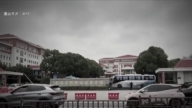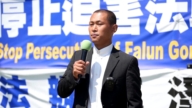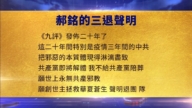【新唐人2015年01月02日訊】來自北京大學、清華大學、中國社科院的十名社會學學者,日前聯名上書中共總書記習近平,呼籲當局關注前不久發生在山西太原的「女農民工討薪反遭警察打死」事件,並指出由於大陸《勞動合同法》形同虛設,農民工的權益無法得到應有的保障,這類悲劇才會一再上演。
2014年年終歲末,一則「警察打死討薪女農民工,死亡後仍遭腳踩頭髮」的圖片消息在網路曝光後,引發了極大民憤。
據大陸媒體報導,在山西太原市打工的河南省鄲城縣農民工王奎林一家,因年底已到,但工資仍被拖欠,準備直接找包工頭討要,被保安阻攔。爭執中警察到場,將王奎琳母親周秀雲毒打致死,父親王有志被打斷四條肋骨。而涉案民警王某僅被當局以涉嫌濫用職權罪逮捕。
中國勞動關係學院教授王江松:「這些警察、公務人員只對某些跟他們利益直接相關的,給他們利益的那些人負責。比如說黑心的老闆啊,這種利益輸送、利益勾結太密切了。我們普通老百姓、民工跟這些警察沒有利益輸送。現在為了這個『利』字,為了利益,甚麼法律、良知全都拋棄了。」
隨著事件的發展,民間在要求嚴懲打人警察的同時,呼籲當局重視農民工權益的聲音也越來越響。
馬曉明:「它看起來是警察和上訪者、討薪人的矛盾,當然警察的粗暴也是令人髮指的,但是更深一層,就是這麼大政府遇到欠薪的問題,不好好的解決,推過來推過去,拖延推諉形成了矛盾的激化。」
12月29號,清華教授沈原、郭于華、北大教授佟新、中國社科院研究員沈紅等十名社會學學者,針對上述事件聯名向當局發出公開信。
參與聯署的學者們認為,警察打死農民工事件,不僅表現了警察的違法執法,也反映了大陸多達4000萬建築業農民工簽訂勞動合同難的問題,以及由此產生的長期存在的欠薪、討薪難、沒有社保、缺乏勞動安全保障、罹患職業病和遭遇工傷後得不到合理賠償等一系列嚴重問題。
學者們表示,他們自2007年發起「關注新生代農民工計劃」,對4000萬建築業農民工的勞動狀況進行了調查研究,發現目前大陸存在大量侵害農民工權益的事件。
學者們指出,第一、勞動部門執法不力,使得《勞動合同法》形同虛設。在調查的138起集體討薪案例中,沒有勞動合同的比例高達95%。
第二、建築業農民工的工資嚴重地拖欠,工傷和職業病得不到賠償。據2013年的調研顯示,依照勞動法規定按月結清工資的建築工人,只佔19.9%,四成的工人表示過去一年的工錢沒有結清,甚至有公司10.5%的工人表示「全部工資款仍被拖欠」。
第三,《建築法》明文禁止建築公司違法轉包、分包建築工程的行為,現實中卻屢禁不止,成為欠薪的重要禍首。
前陝西電視臺記者馬曉明:「勞工的狀況就很悲慘,除了像欠薪,現在還有超時、超額的勞動,像大陸現在,勞工頻頻因為勞累死亡,因為精神不堪單調的和非常繁重的勞動,有跳樓的、自殺的等等。」
信中,學者們還向當局提出了問責勞動部門,真正落實《勞動合同》、推動組建工會,發揮人民監督的力量等建議。
對此,民間學者以中共「反貪」為例,對《勞動法》的實施提出了進一步的看法。
王江松:「現在光反貪是不管用的,貪官是層出不窮的,關鍵是要剷除貪腐的土壤,那就是給老百姓權力。即使制定了很漂亮的法律,中國的法律有很多漂亮條款,像『保護人民生命財產安全』,但關鍵是誰來執法?誰來督法?」
前陝西電視臺記者馬曉明則提出,中國的工會,都是由黨和政府機構任命和設立的,而不是工人自己選舉產生的。除非中國的工人能建立真正屬於自己的、獨立的工會,否則很難維護自身的合法權益。
採訪/田淨 編輯/張天宇 後製/蕭宇
Academics Call for Implementing Labor Rights
Ten sociologists from Peking University, Tsinghua University,
Chinese Academy of Social Sciences jointly addressed a letter
to Communist China leader Xi Jinping regarding a migrant
worker killed by police violence.
The police of Shanxi Province killed a female migrant worker
who asked for wage arrears.
It shows that migrant workers’ rights have been ignored
and labor contract law has been ineffective.
The tragedy will only be staged again.
An outrageous news item erupted at the end of 2014.
An online post showed a female migrant worker was beaten
to death by police when asking for arrears in wages.
The police even stepped on her hair after she was dead.
Chinese media reported, Wang Kuilin and his family came
from Henan Province.
Being migrant workers in Taiyuan, Shanxi, they were ready
to demand the arrears in wages from the contractor,
but were stopped by security.
During the dispute, the police arrived.
Wang’s mother, Zhou Xiuyun was beaten to death;
his father, Wang Youzhi had four broken ribs.
The policeman surnamed Wong was arrested
on suspicion of the crime of abuse of power, only.
China Institute of Industrial Relations, Professor
Wang Jiangsong: “These police officers and civil servants
only work for those who directly relay interests to them,
such as the sinister boss who has very close interest transfer
and collusion with them.
The ordinary people and migrant workers don’t transfer
any benefit to the police.
Thus the police completely abandon the law or
conscience simply for the benefit."
While some people demand stern punishment of the police
who committed the violence,
more people are addressing the protection of migrant workers’
rights and benefits.
Ma Xiaoming: “It looks like a conflict between the police
and the petitioners or the people who demand their wages.
Of course the police brutality is outrageous.
But in fact, the government has failed to resolve
the issue of wage arrears.
A series of delays and ignorance have only
intensified the conflict."
Ten social science scholars jointly issued an open letter
regarding the matter on Dec. 29,
including Shen Yuan and Guo Yuhua from Tsinghua University,
Tong Xin from Peking University,
and Shen Hong from Chinese Academy of Social Sciences.
They believe the police killing of a migrant worker has shown
the police violate the law in law enforcement,
and reflect the difficulty in promoting labor contracts
for 40 million Chinese migrant workers.
Workers have thus suffered from a series of problems
such as the everlasting arrears in wages, lack of social security
and occupational safety protection, and no compensation
for occupational diseases and injuries.
According to the research of 40 million migrant workers
launched in 2007,
academics identified mainland workers’ rights and benefits
have been largely violated.
The research found: First, Labor Contract Law has
existed in name only since the labor department ignores
law enforcement.
In 138 cases of mass incidents with workers demanding
wage arrears, investigation found 95% of them
hadn’t signed a labor contract.
Second, wage arrears are serious in the construction industry,
migrant workers’ injuries and occupational diseases are not
compensatory.
According to a 2013 survey, only 19.9% of construction
workers received monthly wages according to labor law.
40% of them still had wages unpaid from a year ago.
There are certain companies still owing 10.5% of their workers
their total wage.
Third, the Construction Law expressly prohibits the illegal
subcontracting of construction companies;
but, in reality, the subcontracting was never stopped
and became the main culprit in wage arrears.
Former Shaanxi TV reporter Ma Xiaoming: “The situation
for labor workers is very miserable.
Other than wage arrears, there is also overtime.
Excessive labor has exhausted and killed many
in China today.
Many commit suicide due to mental suffering
and heavy labor."
In the letter, the scholars suggest holding the labor department
accountable in implementation of labor contracts,
establishing unions, and allowing civilian supervision.
In this regard, there are further views on the implementation
of labor law, with the anti-corruption campaign as an example.
Wang Jiangsong: “Fighting against corruption is useless
because there are endless corrupt officials.
The key is to eradicate the soil that breeds the corruption.
That is to empower the people.
Law provision such as the Chinese law, ‘to protect people’s
lives and property’, sounds pretty,
but the key is who is going to do the law enforcement?
Who will supervise the law enforcement?"
Ma Xiaoming criticizes that China’s unions are appointed
by the party and government.
Only when Chinese workers are allowed to form their own
independent unions will the workers be able to safeguard
their own legitimate rights and interests.
Interview/TianJing Edit/Zhang Tianyu Post-Production/XiaoYu




























